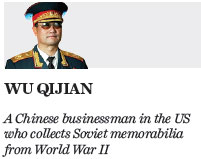An enduring relationship
By He Na (China Daily) Updated: 2015-01-05 07:50First Person
The USSR and my generation

All people of my age (50-somethings) have been influenced by the Soviet Union to some degree. For me, it came primarily from my father, but it's also a result of being born into a military family.
My grandparents were veteran soldiers who took part in the Long March, and my father dedicated his entire working life to designing military aircraft.
When I was recruited by the army and studied at military college, the Chinese military adopted the Soviet system of the time. The officers often organized screenings of documentaries and films about the Soviet Union's role in World War II. I was really impressed by some of the best-known episodes, such as the Battle of Moscow in 1941.
I moved to the United States shortly after the Soviet Union collapsed in 1991, and my love of Soviet-era songs and movies led me to buy a host of DVDs to take with me.
In the US, I collected some Soviet military equipment, including WWII rifles, uniforms and helmets. I have four marshall's uniforms, more than 20 general's uniforms, plus a variety of other ranks. My collection began when I bought some items on eBay. Initially, I just bought a few small pieces, but gradually I became friendly with some reliable dealers who started contacting me when they had stuff they thought I might like.
The collection has cost me a lot of money and time, but it's not easy to store, so it's kept in a special dark room. I go and take a look almost every weekend.
From sadness to success
Chen Duo
An anchor on China Central Television
I was 10 when the People's Republic of China was founded in 1949. That same year, I was chosen as a member of the Chinese delegation at an international children's summer camp in what was then the Soviet Union.
Sadly, I missed my chance because my parents were unable to get my official uniform ready in time for the trip. That's still a source of great disappointment, because the children were presented to Joseph Stalin, the leader of the Soviet Union at the time.
Russian culture, including movies, novels, poetry, music, dance and other art forms influenced me a lot, and helped to form my view of life.
I started studying Russian in middle school. My teacher was a very pretty woman from a mixed Chinese/Soviet background, and I benefited from her teaching by acquiring authentic "Moscow" pronunciation.
I remember that in the late 1950s there were literary gatherings in Beijing almost every week; the works of Alexander Pushkin, Maxim Gorky and other Russian and Soviet writers were among the favorites.
In 1996, I was invited to Russia to host a festival of Chinese art. It was my first visit to the country, and the audience gave me a warm welcome when I spoke a little Russian at the opening ceremony.
In 2009, I read some of Pushkin's poetry (in both Chinese and Russian) at a meeting in Moscow to commemorate the 60th anniversary of the establishment of diplomatic ties between our countries.
Those experiences and my love of Russian and Soviet culture have been guiding lights in my life.
This extract from Chen Duo's blog was translated by He Na.
- Govt encourages people to work 4.5 days a week
- Action to be taken as HIV cases among students rise
- Debate grows over reproductive rights
- Country's first bishop ordained in 3 years
- China builds Tibetan Buddhism academy in Chengdu
- Authorities require reporting of HIV infections at schools
- Typhoon Soudelor kills 14 in East China
- Police crack down on overseas gambling site
- Debate over death penalty for child traffickers goes on
- Beijing to tighten mail security for war anniversary







